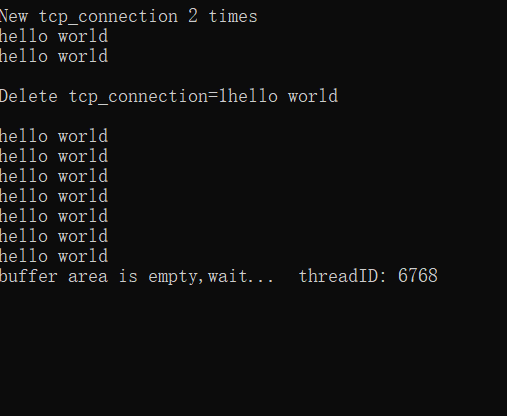asio的网络基本模板(单例模式 消息队列 )

1 // MyAsio.cpp: 定义控制台应用程序的入口点。 2 // 3 4 #include "stdafx.h" 5 #include <iostream> 6 #include <assert.h> 7 #include "NetMgr.h" 8 9 using namespace DEF; 10 /* 11 write by def 12 技术博客 http://www.cnblogs.com/itdef/ 13 技术交流群 群号码:432336863 14 欢迎c c++ windows驱动爱好者 服务器程序员沟通交流 15 部分老代码存放地点 16 http://www.oschina.net/code/list_by_user?id=614253 17 */ 18 19 int main() 20 { 21 NetMgr& p = NetMgr::Instance(); 22 NetMgr& p1 =NetMgr::Instance(); 23 assert(&p == &p1); 24 //std::cout << &p << " " << &p1; 25 p.Start(); 26 return 0; 27 }

1 #pragma once 2 #include "Pre.h" 3 #include <iostream> 4 #include <atomic> 5 6 #include <boost/asio.hpp> 7 #include <boost/bind.hpp> 8 9 #include "SyncQueue.h" 10 11 /* 12 write by def 13 技术博客 http://www.cnblogs.com/itdef/ 14 技术交流群 群号码:432336863 15 欢迎c c++ windows驱动爱好者 服务器程序员沟通交流 16 部分老代码存放地点 17 http://www.oschina.net/code/list_by_user?id=614253 18 */ 19 20 NAMESPACEBEGIN(DEF) 21 using boost::asio::ip::tcp; 22 23 const char MAGIC_CHAR = '|'; 24 25 #pragma pack (push,1) 26 struct BufferHead { 27 char flag; // should equal '|' 28 unsigned int bufferLenth; 29 BufferHead() { 30 flag = 0; 31 bufferLenth = 0; 32 } 33 BufferHead(char f, unsigned int len) { 34 flag = f; 35 bufferLenth = len; 36 } 37 }; 38 39 struct BufferStruct { 40 enum { 41 BUF_MAX_LENTH = 1024 * 2 42 }; 43 BufferHead head; 44 char bufBody[BUF_MAX_LENTH]; 45 BufferStruct() {} 46 BufferStruct(const BufferStruct& b) { 47 head = b.head; 48 memcpy(bufBody, b.bufBody, b.head.bufferLenth); 49 } 50 char* GetBody() { return bufBody; } 51 unsigned int GetLength() { return head.bufferLenth; } 52 }; 53 #pragma pack(pop) 54 55 class tcp_connection 56 : public std::enable_shared_from_this<tcp_connection> 57 { 58 public: 59 typedef std::shared_ptr<tcp_connection> pointer; 60 static pointer create(boost::asio::io_service& io_service, std::shared_ptr<SyncQueue<std::string>> p_messageQueue) 61 { 62 return pointer(new tcp_connection(io_service, p_messageQueue)); 63 } 64 boost::asio::ip::tcp::socket& socket() 65 { 66 return socket_; 67 } 68 void start(); 69 ~tcp_connection() { 70 std::cout << std::endl << "Delete tcp_connection=" << --i << std::endl; 71 } 72 private: 73 tcp_connection(boost::asio::io_service& io_service, std::shared_ptr<SyncQueue<std::string>> p_messageQueue) 74 : socket_(io_service), p_messageQueue_(p_messageQueue) 75 { 76 std::cout << "New tcp_connection " << ++i << " times" << std::endl; 77 } 78 void handle_read_head(const boost::system::error_code& error,size_t bytes_transferred); 79 void handle_read_body(const boost::system::error_code& error,size_t bytes_transferred); 80 boost::asio::ip::tcp::socket socket_; 81 std::shared_ptr<SyncQueue<std::string>> p_messageQueue_; 82 static std::atomic_int i; 83 BufferStruct recvBuff_; 84 }; 85 86 class tcp_server 87 { 88 public: 89 tcp_server(boost::asio::io_service& io_service, int port, std::shared_ptr<SyncQueue<std::string>> p_queue); 90 private: 91 void start_accept() { 92 tcp_connection::pointer new_connection = 93 tcp_connection::create(acceptor_.get_io_service(), p_messageQueue_); 94 acceptor_.async_accept(new_connection->socket(), 95 boost::bind(&tcp_server::handle_accept, this, new_connection, 96 boost::asio::placeholders::error)); 97 } 98 void handle_accept(tcp_connection::pointer new_connection, 99 const boost::system::error_code& error) 100 { 101 if (!error) 102 { 103 new_connection->start(); 104 } 105 106 start_accept(); 107 } 108 std::shared_ptr<SyncQueue<std::string>> p_messageQueue_; 109 boost::asio::io_service& io_service_; 110 boost::asio::ip::tcp::acceptor acceptor_; 111 }; 112 113 114 115 NAMESPACEEND(DEF)

1 #include "NetAsio.h" 2 3 using namespace DEF; 4 /* 5 write by def 6 技术博客 http://www.cnblogs.com/itdef/ 7 技术交流群 群号码:432336863 8 欢迎c c++ windows驱动爱好者 服务器程序员沟通交流 9 部分老代码存放地点 10 http://www.oschina.net/code/list_by_user?id=614253 11 */ 12 std::atomic_int tcp_connection::i = 0; 13 tcp_server::tcp_server(boost::asio::io_service& io_service, int port, std::shared_ptr<SyncQueue<std::string>> p_queue): 14 io_service_(io_service), 15 acceptor_(io_service, boost::asio::ip::tcp::endpoint(boost::asio::ip::tcp::v4(), port)), 16 p_messageQueue_(p_queue) 17 { 18 start_accept(); 19 } 20 21 void tcp_connection::start() { 22 boost::asio::async_read(socket_, boost::asio::buffer(&recvBuff_.head,sizeof(recvBuff_.head)), 23 boost::bind(&tcp_connection::handle_read_head, shared_from_this(), 24 boost::asio::placeholders::error, 25 boost::asio::placeholders::bytes_transferred)); 26 } 27 28 29 //接受包头内容 30 void DEF::tcp_connection::handle_read_head(const boost::system::error_code& error, 31 size_t bytes_transferred) 32 { 33 if (error == boost::asio::error::eof) { 34 return; 35 }else if (error) { 36 std::cerr << " socket recv head error!! " << error.message() << std::endl; 37 return; 38 } 39 char *pBuf = recvBuff_.GetBody(); 40 boost::asio::async_read(socket_, boost::asio::buffer(pBuf, recvBuff_.head.bufferLenth), 41 boost::bind(&tcp_connection::handle_read_body, shared_from_this(), 42 boost::asio::placeholders::error, 43 boost::asio::placeholders::bytes_transferred)); 44 } 45 46 void DEF::tcp_connection::handle_read_body(const boost::system::error_code& error, 47 size_t bytes_transferred) 48 { 49 //处理接收过程中的错误 50 if (error == boost::asio::error::eof) { 51 return; 52 }else if (error) { 53 std::cerr << " socket recv body error!! " << error.message()<<std::endl; 54 return; 55 } 56 //到达此处则接受正常 打印接受内容 57 //std::cout << "recv body : " << recvBuff_.GetBody() << std::endl; 58 59 //todo 接受内容放入队列 另行处理 避免网络IO影响处理效率 60 assert(p_messageQueue_ != nullptr); 61 p_messageQueue_->Put(recvBuff_.GetBody()); 62 63 //再次进入异步等待 进行下一次包头的接收 64 boost::asio::async_read(socket_, boost::asio::buffer(&recvBuff_.head, sizeof(recvBuff_.head)), 65 boost::bind(&tcp_connection::handle_read_head, shared_from_this(), 66 boost::asio::placeholders::error, 67 boost::asio::placeholders::bytes_transferred)); 68 }

1 #pragma once 2 #include "pre.h" 3 #include <boost/asio.hpp> 4 5 #include "SyncQueue.h" 6 /* 7 write by def 8 技术博客 http://www.cnblogs.com/itdef/ 9 技术交流群 群号码:432336863 10 欢迎c c++ windows驱动爱好者 服务器程序员沟通交流 11 部分老代码存放地点 12 http://www.oschina.net/code/list_by_user?id=614253 13 */ 14 NAMESPACEBEGIN(DEF) 15 using boost::asio::ip::tcp; 16 17 class NetMgr { 18 public: 19 //单例 20 static NetMgr& Instance() { 21 static NetMgr instance; 22 return instance; 23 } 24 void Start(); 25 26 private: 27 NetMgr() :p_messageQueue_(std::make_shared<SyncQueue<std::string>>(100)) {} 28 void NetThread(std::shared_ptr<SyncQueue<std::string>> pQueue); 29 void CommandDispatch(std::shared_ptr<SyncQueue<std::string>> pQueue); 30 const std::string EXITCOMMAND= "EXIT"; 31 ~NetMgr() {} 32 std::shared_ptr<SyncQueue<std::string>> p_messageQueue_; 33 boost::asio::io_service io_service_; 34 }; 35 36 37 38 39 40 41 NAMESPACEEND(DEF)

1 #include <thread> 2 #include <iostream> 3 #include "NetMgr.h" 4 #include "NetAsio.h" 5 6 using namespace DEF; 7 /* 8 write by def 9 技术博客 http://www.cnblogs.com/itdef/ 10 技术交流群 群号码:432336863 11 欢迎c c++ windows驱动爱好者 服务器程序员沟通交流 12 部分老代码存放地点 13 http://www.oschina.net/code/list_by_user?id=614253 14 */ 15 void NetMgr::NetThread(std::shared_ptr<SyncQueue<std::string>> pQueue) { 16 assert(pQueue != nullptr); 17 boost::asio::io_service& io_s = io_service_; 18 tcp_server ts(io_s, 9988, pQueue); 19 io_s.run(); 20 } 21 22 void NetMgr::CommandDispatch(std::shared_ptr<SyncQueue<std::string>> pQueue) { 23 assert(pQueue != nullptr); 24 for (int i = 0; i < 11; i++) { 25 std::string s; 26 pQueue->Take(s); 27 std::cout << s << std::endl; 28 } 29 30 } 31 32 void NetMgr::Start() { 33 std::thread t1 = std::thread(&NetMgr::NetThread,this, p_messageQueue_); 34 std::thread t2 = std::thread(&NetMgr::CommandDispatch,this, p_messageQueue_); 35 std::string input; 36 std::cout << "Input "" << EXITCOMMAND << "" to exit"; 37 while (std::cin >> input) 38 { 39 //todo add command parse 40 if (input == EXITCOMMAND) { 41 break; 42 } 43 std::cout << input << std::endl; 44 } 45 t1.join(); 46 t2.join(); 47 }
如何优雅的退出是个很麻烦的问题,细节在实际工作需要在慢慢打磨
运行如图:



